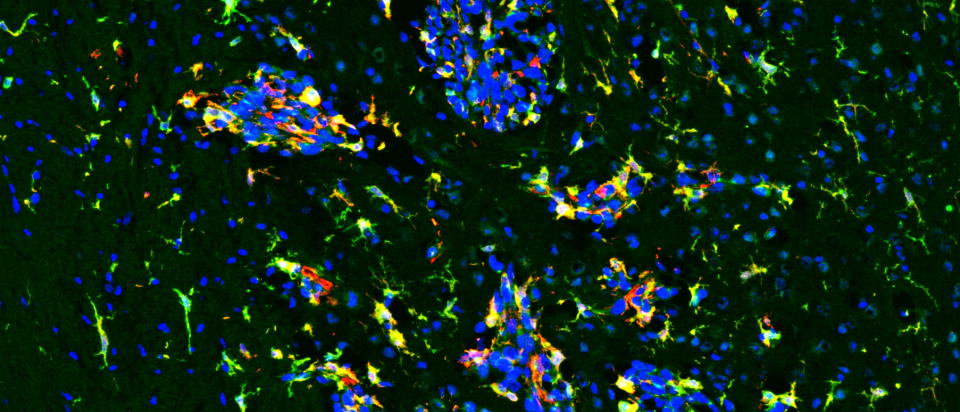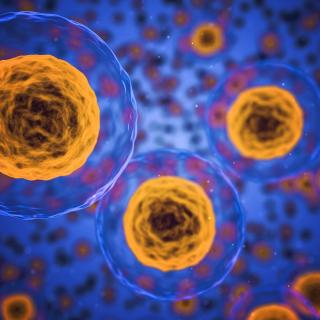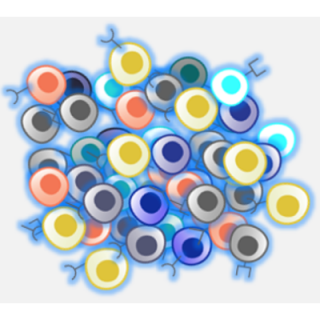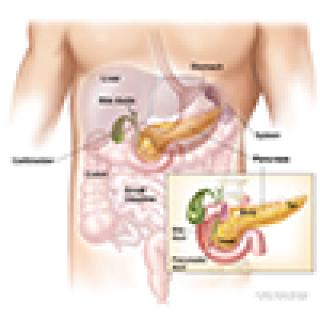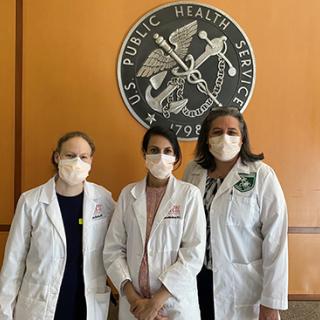News and Events
New Strategy Shows Promise Against Deadly Breast Cancer in the Brain
A new NIH study points to a promising strategy for treating aggressive breast cancer that spreads to the brain, a complication with few effective options. Learn how blocking a key brain cell survival pathway could open the door to future therapies.
Read MoreClinical trial studies six-drug combination aimed at relapsed/refractory B-cell lymphoma
Christopher J. Melani, M.D., Assistant Research Physician in the Lymphoid Malignancies Branch, is leading a study to see whether a combination of six drugs is safe and can help people with both aggressive and indolent B-cell lymphoma.
Read MoreSheue-yann Cheng receives 2021 Valerie Anne Galton Lectureship Award
Sheue-yann Cheng, Ph.D., Senior Investigator in the Laboratory of Molecular Biology, is the first recipient of the 2021 Valerie Anne Galton Distinguished Lectureship Award from the American Thyroid Association. This award recognizes an individual who has been instrumental in collaborative research that has significantly contributed to the advancement of clinical knowledge of thyroid conditions.
Read MoreProtein that drives aggressive liver cancer identified
Cancers with more protein diversity (heterogeneity) tend to be more aggressive and less responsive to treatment. CCR researchers led by Xin Wei Wang, Ph.D., Deputy Chief of the Laboratory of Human Carcinogenesis and co-Director of the CCR Liver Cancer Program, have identified a protein that may drive an evolution toward greater heterogeneity in two forms of liver cancer.
Read MoreImmune cells promote breast cancer’s metastasis to the brain in young mice
Animal studies led by Patricia S. Steeg, Ph.D., Deputy Chief of the Women’s Malignancies Branch, suggest that younger immune systems promote breast cancer’s metastasis to the brain — but that the risk can be reduced by triggering immune changes that usually occur later in life.
Read MoreInternational study of rhabdomyosarcoma finds genetic clues, potential for tailored therapy
New findings from the largest-ever international study on rhabdomyosarcoma – the most common type of soft tissue sarcoma in children – suggest that children with the disease could benefit from tumor genetic testing. Javed Khan, M.D., Deputy Chief of the Genetics Branch, led the study.
Read MoreNew study tests therapy in patients with hemorrhagic cystitis after bone marrow transplant
Jennifer A. Kanakry, M.D., Associate Research Physician in the Experimental Transplantation and Immunotherapy Branch, is leading CCR’s participation in a study of a drug, Viralym-M, that targets six viruses that can cause hemorrhagic cystitis (HC) in people who have had a hematopoietic cell transplant. Researchers are most interested in Viralym-M’s ability to clear the symptoms of HC faster than a placebo and evaluating Viralym-M’s effect on five other viruses.
Read MoreHoward A. Young receives 2021 ICIS Mentorship Award
Howard A. Young, Ph.D., Senior Investigator in the Laboratory of Cancer Immunometabolism, is the first recipient of the newly established International Cytokine & Interferon Society (ICIS) Mentorship Award. This award recognizes ICIS members who have made significant and sustained contributions to the career development of trainees and to the profession through outstanding mentoring.
Read MoreClinical trial studies immunotherapy and radiation for pancreatic cancer
Fewer than 10 percent of people with pancreatic cancer can have surgery, which offers the best chance of a cure. Udo Rudloff, M.D., Ph.D., Senior Investigator in the Pediatric Oncology Branch, is leading a study testing a combination of immunotherapy and radiation for people with advanced pancreatic cancer to shrink tumors and make surgery possible.
Read MoreCCR postbaccalaureate fellow awarded Fulbright to study cancer disparities in Nigeria
Anu Ajao is a CCR postbaccalaureate fellow who recently received a Fulbright Research Award to study personal care products and breast cancer risk in Nigerian women. In our Q&A, Anu discusses her fellowship experience as a mentee of Stefan Ambs, Ph.D., M.P.H., Senior Investigator in the Laboratory of Human Carcinogenesis, and the cancer health disparities research she will conduct this fall in Nigeria.
Read MoreA conversation with CCR immunotherapy experts
June is Immunotherapy Awareness Month. We asked members of the Surgery Branch about their work with immunotherapy as they continue to make important advances in this growing field.
Read More